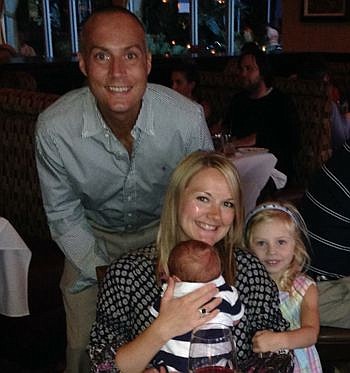
I have a Federal Court brief due tomorrow, a hearing and a Jax Bar Luncheon on Wednesday, a deposition and an Inn of Court meeting on Thursday, a mediation and a YLS service project on Friday, my Salem Grace is teething and my husband is in trial out of town.
I am way too busy for work-life balance. Truth be told, this feeling is all too familiar for lawyers these days.
Whether you are a young lawyer trying to appease your boss (this is a complete hypothetical, Tom and Eric … wink, wink) while trying to cultivate your own business, a sole practitioner chasing clients for payment so you can make payroll or a partner trying to make your billing goal, the pressures are there and they are real.
For the past several years, both The Florida Bar and The Jacksonville Bar Association have placed great emphasis on lawyers maintaining work-life balance.
Mental health issues, substance abuse and even suicide rates are on the rise in our profession, which is a scary thought. This phenomenon has been covered in The New York Times, Forbes and Business Week, plus a multitude of other blogs and articles.
Experts say one of the ways to combat this problem is for lawyers to try and achieve this elusive goal of work-life balance. But this concept seems tough to define and even more difficult to put into practice. So, where does that leave us?
On Oct. 15, I lost a dear friend to a horrible disease. Christian Winicki was diagnosed with a very rare form of cancer in May of 2013. I remember being completely shocked at the news because, having known Christian since we were 15 years old, he was always active, physically fit and vigorous.
How could this have happened to someone like him? And then to hear the cancer was Stage 4 and had metastasized to other areas of his body was almost too much to take.
He was 32 years old. He had a promising legal career. He had a wife and a 2-year-old little girl. He had his whole life ahead of him.
For many, hearing this devastating news about their own future would cause them to pull back and shut off.
Not Christian. Christian did just the opposite.
He began treatment here at the Mayo Clinic and also in New York City at Memorial Sloan Kettering Cancer Center.
All of his doctors told him it was imperative he put his treatment first and his work, family and friends second. Basically, his treatment needed to become his full-time job and his top priority.
And while Christian fought like hell against this terrible disease for two-and-a-half years, he never let it consume or define him.
He never let it or his treatment take away from playing princess with his daughter, Kiely, or traveling to see the Tar Heels play with his wife, Chelsea, or visiting friends from college in Colorado or attending a wedding, a party or a family get-together.
During many of these events, Christian was often in the midst of chemo or just coming out of a series of genetic testing or a medical trial. He was often in pain and exhausted, but he was there.
He was there with an amazing attitude and an infectious smile on his face. He loved and lived and experienced more in those two-and-a-half years than many do in a lifetime.
Christian Winicki was a smart and capable lawyer, but he was an even better husband to his wife, Chelsea, father to his children, Kiely and CJ, and friend to me and to so many others because he was present. Really present.
For that, his legacy will live on through his wife and children, but also through me and his friends and all of the lives he touched.
So, in considering how to maintain work-life balance and in remembering Christian and his remarkable life, I am reminded to be there, to be present.
Whether I am working on a deadline, but spend some extra time on the phone with a client; anxiously waiting for an email from opposing counsel, but turn my phone off at night while playing with my daughter; or leaving work before 5 p.m. on Friday to keep a happy hour date with my husband.
My doing these things certainly does not mean the work-life balance goal has been met, by any means, but it is certainly a step in the right direction.
As my father says, “You can achieve any goal you have if you focus on the steps to take instead of the distance to get there.”